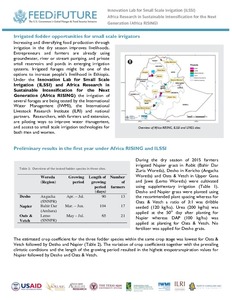Location
The International Water Management Institute (IWMI) is a non-profit, scientific research organization focusing on the sustainable use of water and land resources in developing countries. It is headquartered in Colombo, Sri Lanka, with regional offices across Asia and Africa. IWMI works in partnership with governments, civil society and the private sector to develop scalable agricultural water management solutions that have a real impact on poverty reduction, food security and ecosystem health. IWMI is a member of CGIAR, a global research partnership for a food-secure future.
IWMI’s Mission is to provide evidence-based solutions to sustainably manage water and land resources for food security, people’s livelihoods and the environment.
IWMI’s Vision, as reflected in the Strategy 2014-2018, is ‘a water-secure world’. IWMI targets water and land management challenges faced by poor communities in the developing countries, and through this contributes towards the achievement of the United Nations Millennium Development Goals (MDGs) of reducing poverty and hunger, and maintaining a sustainable environment. These are also the goals of CGIAR.
IWMI works through collaborative research with many partners in the North and South, and targets policymakers, development agencies, individual farmers and private sector organizations.
Resources
Displaying 71 - 75 of 959Irrigated fodder opportunities for small scale irrigators
Impact of water-user associations on water and land productivity, equity, and food security in Tajikistan. Baseline Technical Report
How women’s access to small reservoirs can improve household livelihoods in northern Ghana
Har Khet Ko Pani(Water to Every Farm): rethinking Pradhan Mantri Krishi Sinchai Yojana (PMKSY)
Evaluating the flow regulating effects of ecosystems in the Mekong and Volta river basins
By altering evapotranspiration and influencing how water is routed and stored in a basin, natural and agrarian ecosystems affect river flow. To quantify the impact of ecosystems on streamflow in two large river basins in Asia and Africa, simple statistical relationships were calculated, enabling flow characteristics to be ascertained from basic catchment features. This approach allows the impact of specified land-use change on streamflow to be determined.







